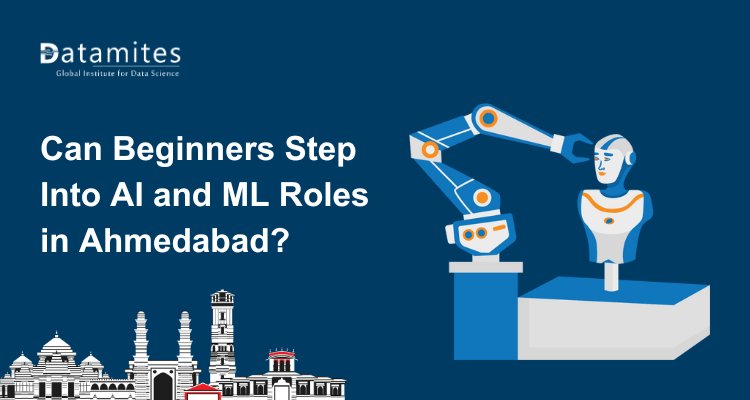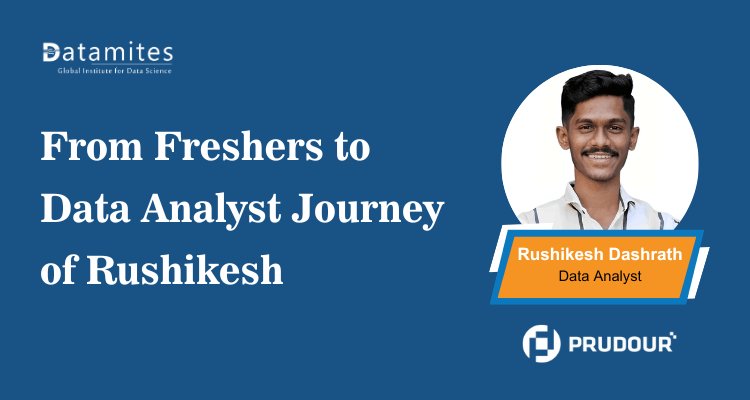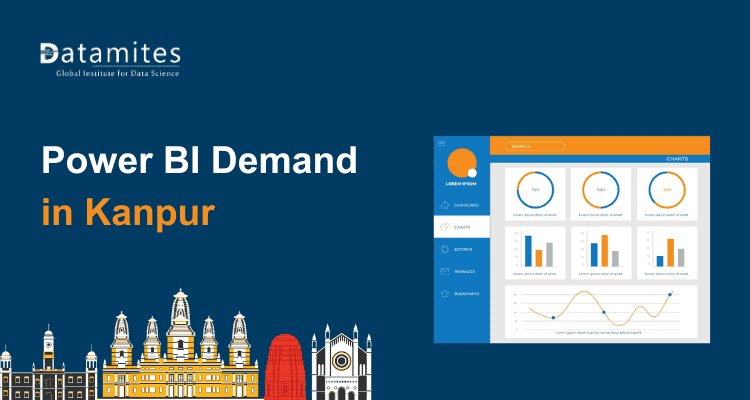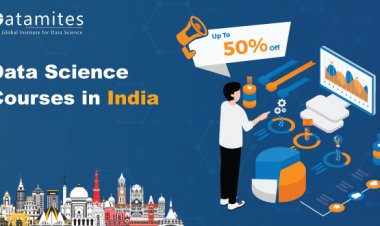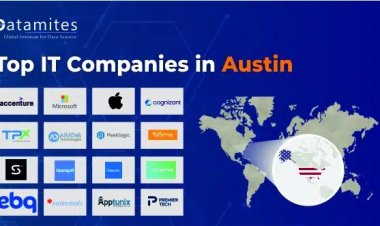The Rise of Data Science in the Agriculture Industry
Data science is revolutionizing agriculture by enabling data-driven decisions that boost crop yields and resource efficiency. From predictive analytics to precision farming, it's transforming how food is grown and managed.
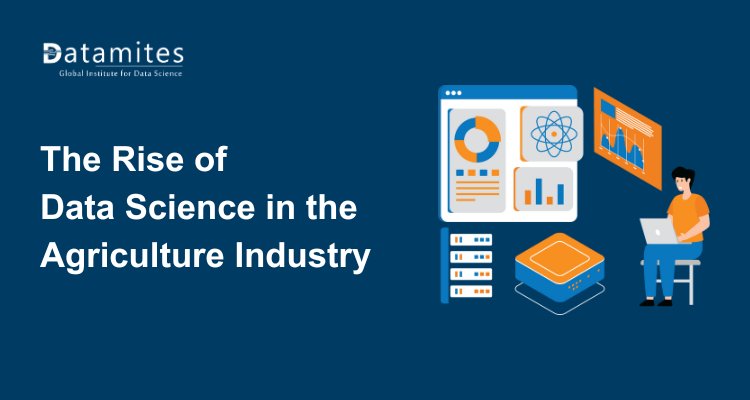
The agriculture industry is undergoing a major digital transformation, shifting from manual, intuition-based practices to data-driven agriculture powered by algorithms, sensors, and predictive models. This evolution reflects the growing impact of data science on agriculture, enabling smarter, more efficient farming methods.
According to MarketsandMarkets, the global agriculture analytics market is expected to grow from $1.4 billion in 2020 to $4.2 billion by 2025, with a CAGR of 25.4%. As a result, the demand for data science professionals in farming is surging. Many are turning to data science courses for agriculturein both online and offline, to gain the necessary skills in data science and seize emerging opportunities in agriculture analytics.
Understanding How Data Science Is Shaping the Future of Farming
Farming is no longer just about plowing fields and harvesting crops today, it's about collecting data, analyzing patterns, and making informed decisions. Data science in agriculture is revolutionizing the way farmers plan, manage, and optimize their operations. By harnessing technologies like AI, machine learning, and IoT, farmers are transitioning to data-driven agriculture that is more sustainable, efficient, and profitable.
With tools that offer real-time insights into soil health, crop growth, pests, and weather, smart farming with data science enables precise, efficient interventions. This not only boosts yields but also conserves vital resources. The applications of data science in agriculture are unlocking predictive capabilities that were once unimaginable. A McKinsey report estimates that digital agriculture could add $500 billion to global GDP by 2030, underscoring its vast economic impact and the rising demand for data science in farming. As the scope of data science grows, so does its power to transform global agriculture.
Refer these articles:
- Getting Started with Python for Data Science
- How Data Science is Shaping the Healthcare Industry
- How the Financial Sector is Leveraging Data Science
Key Roles of Data Science in Agriculture
Data science turns farm data into insights, helping improve yields, optimize resources, and make agriculture more efficient and sustainable. Here are the key ways data science in agriculture is driving change:
Precision Agriculture
The application of data science in agriculture has found its strongest foothold in precision agriculture. According to the UN Food and Agriculture Organization (FAO), precision farming can improve productivity by up to 30% while reducing water usage by 20%.
With precision agriculture using data science, farmers use sensors, drones, and GPS data to monitor crops at a granular level. This results in optimized fertilizer use, better pest control, and more efficient irrigation strategies.
Crop Yield Prediction
Crop yield modeling is now significantly more accurate due to machine learning. A study by the International Food Policy ResearchInstitute (IFPRI) in India found that using weather and soil data in predictive models boosted forecast accuracy by over 85%.
These models showcase how agricultural data analysis can improve planning and reduce losses. Many starting a career in data science work on similar projects that deliver practical, high-impact results in agritech.
Soil Health Monitoring
The USDA states that 60% of yield variability is due to soil conditions. Using data science tools in agriculture, farmers can continuously assess soil pH, organic matter, and mineral levels using IoT devices and analyze this data in real-time.
Many data science courses now include modules focused on soil data analysis, which are critical for sustainable agriculture. This enables farmers to act on micro-level data, increasing efficiency and promoting long-term soil health.
Weather Forecasting
Agriculture is weather-sensitive. A World Bank report highlights that accurate weather forecasting can reduce crop loss by 25%. With data-driven agriculture, farmers now use real-time meteorological data and AI models to anticipate droughts, frost, and other climate risks.
This capability, backed by modern data science training, allows them to adapt more proactively and safeguard their livelihoods.
Pest and Disease Detection
Crop diseases account for over 20–40% of global agricultural losses, according to the FAO. Smart farming with data science can minimize this through early detection.
For instance, IBM has developed AI-driven pest forecasting tools that use satellite data and ground-level imagery to predict outbreaks with high accuracy. These tools are being integrated into farm management systems by those trained through a data science institute.
Smart Farm Management Systems
The adoption of digital farm management platforms is accelerating. A recent survey by Statista indicated that over 50% of large farms in the U.S. now use digital tools for crop planning and resource monitoring.
These systems integrate everything from irrigation schedules to livestock health, managed through real-time dashboards. With the role of data science in farming growing, farm owners increasingly seek professionals with skills in data science to manage such systems.
Supply Chain and Market Analytics
A report from the World Economic Forum notes that 30% of all agricultural produce is lost before it reaches the market largely due to supply chain inefficiencies.
By using agriculture analytics and market trend modeling, farmers and agri-businesses can reduce waste, optimize logistics, and increase profitability. This is a high-growth area for anyone seeking a career in agricultural data science.
Agricultural Genomics and Breeding
Biotech firms use genomic data to create high-yielding and climate-resilient crops. According to Grand View Research, the agricultural genomics market is expected to reach 9.5% from 2023 to 2030..
With tools like CRISPR and AI-based genome sequencing, this represents the cutting edge of the future of data science in agriculture.
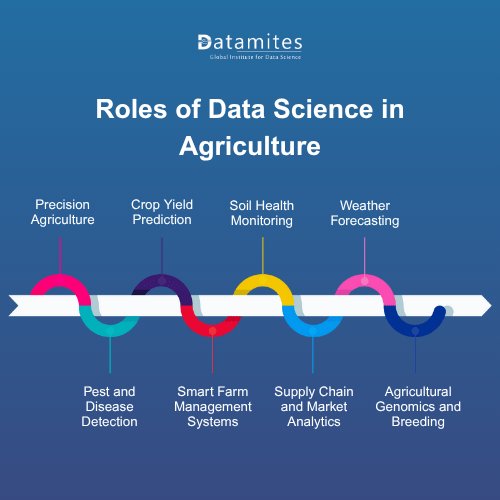
Refer these articles:
- How to Become a Data Scientist in Pune?
- Data Science Course Fee in Pune
- Why Data Scientist Career in Pune
Real-World Applications of Data Science in Agriculture
Applications of data science in agriculture are already transforming farms worldwide. From mobile apps for smallholder farmers in India to AI platforms used by global agribusinesses, data-driven agriculture is making farming smarter, more efficient, and sustainable.
- John Deere – Uses sensors and machine learning in its equipment to optimize performance and support precision agriculture.
- Microsoft & ICRISAT – Developed an AI-based sowing app, helping farmers boost yields by 30–40%.
- IBM Watson – Combines weather, drone, and IoT data for predictive farming insights like pest alerts and irrigation timing.
- Climate Corporation – Offers the FieldView platform for real-time field monitoring and predictive crop planning.
- CropIn – Provides AI tools for smallholder farms to digitize records, monitor health, and receive pest alerts.
- Taranis – Uses drones and deep learning to detect crop issues early, enhancing remote sensing applications.
- AgriDigital – Integrates blockchain and data science to streamline grain supply chains and predict disruptions.
- FAO Data Lab – Applies big data and AI for global food monitoring and agriculture policy planning.
Benefits and Challenges of Using Data Science in Agriculture
Here’s a look at the most impactful advantages and pressing hurdles shaping the adoption of data science in modern farming.
Benefits of Using Data Science in Agriculture:
- Boosts crop yields by up to 30% through precision agriculture using data science.
- Enhances resource efficiency with smart farming powered by data science.
- Enables early pest and disease detection using AI-driven agriculture analytics.
- Improves forecasting and planning through advanced data science tools in agriculture.
- Empowers farmers with informeddecisions via data science training and insights.
Key Challenges of Data Science in Agriculture
- High setup costs for sensors and software limit access for smallholder farmers.
- Low digital literacy and lack of specialized data science courses for agriculture slow adoption.
- Poor internet connectivity in rural areas restricts data-driven farming.
- Shortage of skilled professionals with both skills in data science and agricultural knowledge.
- Data privacy and ownership concerns hinder trust in digital platforms.
- Nonetheless, as the demand for data science increases, more resources and training centers are being made available in rural and semi-urban regions to address these gaps.
Refer these articles:
- Why Data Scientist Career in Coimbatore
- How to become a Data Scientist in Coimbatore?
- Data Science Course Fees in Coimbatore
How Farmers and Agri-Businesses Can Leverage Data Science Today
Farmers and agri-businesses can start using data science in agriculture by adopting simple, scalable tools like mobile apps, sensors, and cloud-based platforms. These enable data-driven agriculture without major investment.
Key steps include:
- Using GPS tools and sensors for precision agriculture using data science
- Leveraging platforms like FieldView or CropIn for real-time insights
- Enrolling in a data science course for agriculture to gain practical skills in data science
- Partnering with experts from a data science institute for tailored solutions
- Applying agriculture analytics to improve planning, yields, and market decisions
With rising demand for data science, even small farms can benefit from its growing scope in agriculture.
Data science is already transforming agriculture in enhancing precision farming, crop forecasting, and breeding. With growing accessibility and demand, now is the ideal time to explore the scope of data science in farming. Whether through offline data science courses in Coimbatore or online training, gaining skills in data science can lead to a rewarding, impactful career in agricultural data science. Ultimately, data science empowers smarter farming, higher yields, and a more sustainable future.
Among the top institutions advancing data science education, DataMites Institute stands out for its strong industry alignment in particularly for those looking to build a career in data science across sectors like healthcare and technology. With a focus on real-world application, DataMites blends an industry-relevant curriculum with hands-on projects and live internship programs, helping learners bridge the gap between theory and practice.
DataMites Training Institute offers Certified Data Scientist programs accredited by IABAC and NASSCOM FutureSkills, covering essential areas like machine learning, data science tools, and advanced analytics. These competencies are increasingly vital in domains such as healthcare, where applications of data science drive predictive analytics, AI diagnostics, and smart decision-making.
For learners preferring in-person education, DataMites provides offline data science classes in Pune, Bangalore, Chennai, Hyderabad, Pune, Mumbai, Coimbatore, and Ahmedabad. It also supports global learners with flexible online data science training options. Whether you’re starting out or upskilling, DataMites delivers job-focused, practical training to prepare you for the future of data science.

